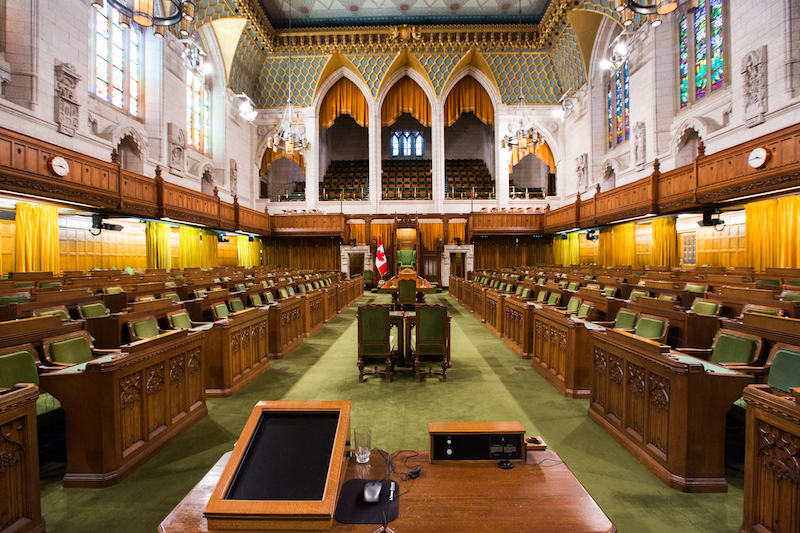

News
Federal and Provincial Budgets
Business leaders want better R&D support from Ottawa to boost productivity, innovation: KPMG
April 10, 2024
By
Talent Canada
 The interior of the House of Commons in Ottawa. Photo: Steven Kriemadis/Getty Images
The interior of the House of Commons in Ottawa. Photo: Steven Kriemadis/Getty Images The vast majority of Canadian business leaders want the federal government to support a wider range of research and development (R&D) activities and provide tax relief for Canadian intellectual property (IP) to make their companies and, in turn, the economy more productive, according to a KPMG survey.
Amid high demand for the Scientific Research and Experimental Development (SR&ED) program across the country, more than eight in 10 leaders (84 per cent) would like the program to be simplified and expanded to encourage more investment in the innovations that create economic prosperity.
“Canada’s lack of domestic research and development is a key factor in the country’s lagging productivity, relative to other industrialized countries,” said David Durst, Partner-in-Charge, Tax Incentive Practice, KPMG in Canada.
“Canadian businesses have faced challenges transforming ideas and innovations into viable, profitable ventures that spur economic growth and lead to a higher standard of living for Canadians. Currently, there are tax incentives for early-stage R&D; however, widely available support to transition the resulting knowledge into commercialized patents is missing in Canada’s approach.”
- 84 per cent of 534 business leaders at small- and medium-sized companies across Canada believe the process of applying for and receiving SR&ED tax credits needs to be simplified
- 74 per cent say the amount of the SR&ED tax incentive/refund is not sufficient to warrant their investment
- 78 per cent say they would conduct their own R&D if the investment tax credit (ITC) rate was higher than 35 per cent
- 82 per cent believe SR&ED should be expanded to cover a broader range of activities and expenses, such as equipment and the commercialization of research, even if the program had a lower ITC
- 86 per cent prefer to see federal government policies and tax relief that support business growth, innovation and productivity, over personal tax credits
SR&ED is the single-largest R&D support program in Canada, providing Canadian-controlled private companies with an enhanced 35 per cent refundable tax credit on their first $3 million of qualified R&D-related expenses, and public and foreign companies with a 15 per cent non-refundable credit for R&D conducted within Canada.
The survey reveals that business leaders view the current definitions of research activities and expenditures under the SR&ED program as too narrow, covering only scientific research and experimental development. Seventy-eight per cent acknowledged that the R&D their business performs is currently not eligible for SR&ED.
“Business leaders also want more routine R&D that yields productivity improvements for their company to be made eligible under SR&ED, even if the tax credit rate is lower,” said Durst. “The question becomes whether the federal government’s review of innovation programs will support a broader range of R&D in Canada that may not be patentable, but directly improves business productivity.”
Support for a Canadian patent box regime
The Department of Finance is currently undertaking public consultations until April 15 to modernize the $3.5 billion SR&ED program on a cost-neutral basis. Finance has also requested public input on a “patent box” regime, which would offer tax breaks to encourage companies to develop and keep IP in Canada.
Eight in 10 (81 per cent) of leaders say they would conduct more R&D if the government introduced a patent box model, which would provide a lower corporate tax rate on revenues derived from Canadian IP.
The government’s stated objective in proposing a patent box regime would be to encourage new and existing Canadian businesses to conduct their R&D in Canada by providing a preferential tax rate for the income generated from the IP resulting from that R&D. In addition to providing direct support for initial R&D activity, other countries provide incentives to help ensure that the benefits of locally-developed IP stays within their economies to create jobs and other social and economic benefits, said Brian Ernewein, Senior Advisor, National Tax Centre, KPMG in Canada.
“Generally, the income tax system should be neutral in its treatment of business income to avoid distorting the allocation of investment capital and impairing competitiveness” said Ernewein. “However, there is a case for a well-designed, preferential intellectual property tax regime, under which the qualifying income is derived from R&D conducted in Canada. The additional support for R&D performed here could ease the path toward commercialization and reduce the pressure to locate patents and other IP outside Canada in order to benefit from lower tax rates elsewhere.”
Print this page